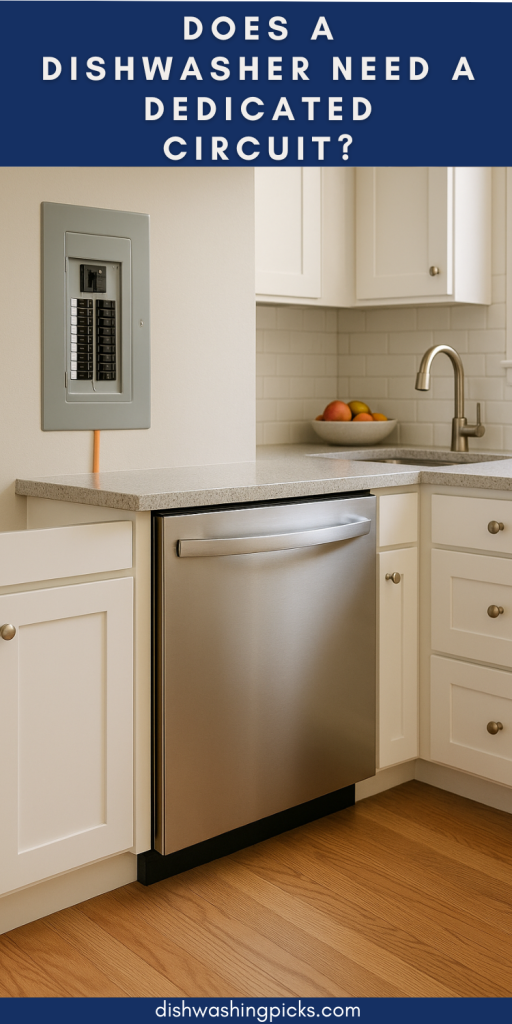
Ever stared at your kitchen’s electrical panel and wondered, “Do I need a special circuit just for my dishwasher?” You’re not alone! It’s a question many homeowners and renters ask because, well, electricity and appliances can get tricky fast.
Imagine this: You’re mid-wash cycle, and suddenly the lights flicker or — worse — the circuit breaker trips. Annoying, right? That’s often a sign the dishwasher is sharing too much electrical real estate with other gadgets.
So, why might a dishwasher need a dedicated circuit? And what exactly does that even mean? Think of a dedicated circuit like giving your dishwasher its own private power highway — no traffic jams, no slowing down, just smooth sailing.
But here’s the kicker: Not all dishwashers or setups are created equal. Some smaller or older models might get by sharing a circuit, but modern dishwashers, especially ones with fancy features like heated drying or smart sensors, can draw enough power to warrant their own lane.
Why a Dedicated Circuit Makes Sense for Your Dishwasher
So, what’s the big deal about giving your dishwasher its own circuit? Well, dishwashers can pull a good chunk of power — usually between 10 to 15 amps. If they’re sharing a circuit with other appliances like garbage disposals, microwaves, or even kitchen lights, things can get dicey.
Ever had a breaker trip right when your dishwasher starts? That’s your home’s way of saying, “Hey! Too much power draw here.” By having a dedicated circuit, you avoid this drama. It’s like giving your dishwasher VIP access — uninterrupted power, which means better performance and fewer annoying interruptions.
Also, from a safety standpoint, dedicated circuits help prevent overheating wires and reduce fire risks. Electric mishaps are no joke, so it’s better to be safe than sorry.
When Is a Dedicated Circuit Required?
Here’s the nitty-gritty: The National Electrical Code (NEC) often requires dishwashers to have a dedicated 15 or 20-amp circuit. This is especially true for newer homes or when installing a new dishwasher.
If your dishwasher is hardwired (wired directly into your home’s electrical system) or plugs into a standard outlet, this matters. Some dishwashers can’t just share an outlet with other appliances because of their power needs.
Of course, local codes can vary, so checking with an electrician or local building department is always a smart move. After all, you don’t want a surprise inspection failing your kitchen setup!
What If You Don’t Have a Dedicated Circuit?
Now, let’s say you skipped the dedicated circuit step. What happens? Well, aside from your breaker frequently tripping, you might notice your dishwasher runs slower or doesn’t heat the water properly. That can lead to less clean dishes — and who wants that?
You might also hear buzzing or flickering lights when the dishwasher runs, which is a red flag for electrical overload.
At best, it’s just annoying. At worst, it’s a safety hazard.
Practical Tips to Manage Your Dishwasher’s Power Needs
- Check your circuit breaker box: Look for a label that says “Dishwasher” or check the amperage ratings on the breakers.
- Use a dedicated outlet if you have one: This is a plug just for the dishwasher, not shared with other appliances.
- Hire a pro: An electrician can easily install a dedicated circuit if you don’t have one. It’s an investment in peace of mind.
- Consider dishwasher specs: If you’re buying a new dishwasher, check the manual or label to see its power requirements. This helps you plan the right electrical setup.
Wrapping It Up: Power Up Your Dishwasher the Right Way
So, do you need a dedicated circuit for your dishwasher? In most cases, yes — especially if you want it to run smoothly without tripping breakers or causing electrical headaches.
Think of it this way: giving your dishwasher its own power line is like giving it the red carpet treatment it deserves. It keeps things safe, efficient, and lets you focus on what really matters — sparkling clean dishes and a happy kitchen.
Got questions about your kitchen’s wiring? Don’t hesitate to reach out to an electrician. Better safe and well-powered than sorry!
